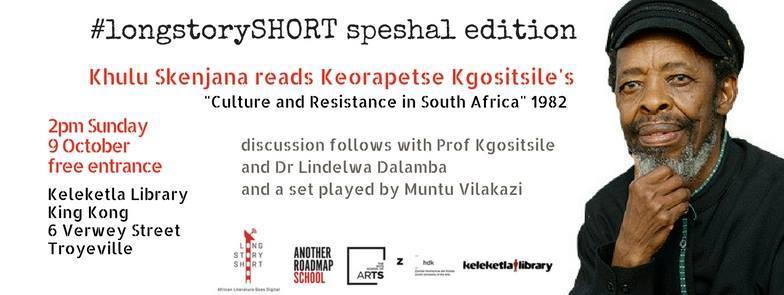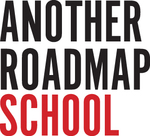
#longstorySHORT Speshal Edition, in partnership with Keleketla! Library and Wits School of Arts as part of the Another Roadmap School presents:
Khulu Skenjani reads Prof Keorapetse Kgositsiles’s 1983 ‘Culture and Resistance in South Africa’
Respondents: Prof Keorapetse Kgositsile and Dr. Lindelwa Dalamba
9 October 2016
2-6pm
Keleketla! Library, Johannesburg
Prof Keorapetse Kgositsile
Professor Keorapetse Willy Kgositsile is South Africa’s National Poet Laureate and Special Adviser to the Minister of Arts and Culture.
Kgositsile has taught at a number of universities in the United States and in Africa including the University of Denver, Wayne State University, the University of California at Los Angeles (UCLA), and the universities of Dar es Salaam, Nairobi, Botswana, Zimbabwe, Zambia, and Fort Hare.
Kgositsile has worked in various structures and departments of the African National Congress (ANC). In exile he was a founding member of the ANC’s Department of Arts and Culture and that of Education. He was also the Chairperson of the Regional Political Committee in Zimbabwe. In Botswana he worked in the underground structures of the Political/Military Council (PMC). He is a founding member of the ANC Veterans League and was a member of the ANC National Centenary Task Team.
Kgositsile is one of the most internationally acclaimed and widely published South African poets. Some of his work has been translated into many languages. His poetry collections include My Name is Afrika, The Present is a Dangerous Place to Live, Heartprints, When the Clouds Clear, To the Bitter End, If I Could Sing, This Way I Salute You. He has been the recipient of a number of literary awards including the Gwendolyn Brooks Poetry Prize, the Harlem Cultural Council Poetry Award, the Conrad Kent Rivers Memorial Poetry Award, the Herman Charles Bosman Prize. In 2008 he was awarded the National Order of Ikhamanga: Silver (OIS). He was awarded the degree Doctor of Literature and Philosophy (DLitt et Phil) (honoris causa) by UNISA in 2012.
Dr. Lindelwa Dalamba
Lindelwa Dalamba graduated from Rhodes University and from the University of KwaZulu-Natal. Her research interests centre in South African jazz and jazz-influenced popular music styles, exile, memory, music historiography and the place of music in South African literature. She has recently completed a PhD (Historical Musicology) at St. John’s College, Cambridge. Her dissertation focuses on South African Jazz in England during the apartheid years (1961-1985). It explores how ‘South African jazz’ intersected with discourses on ‘African jazz’ (1960s), free jazz and/or improvised music (1970s) and the turn to so-called ‘world music’ in the 1980s.
Khulu Skenjana
Actor extraordinaire
Masello Motana
Masello Motana practices various artistic disciplines with zeal and originality. She is a multi-disciplinary performer that works in a variety of mediums including television, theatre, film, street performance and live music. Her diverse experience ranges from acting, singing, poetry, storytelling and intervention satire. Motana is most popularly known for her acting and presenting work on television, most recently for her lead role in the film A Million Colours. Her television credits include the Emmy nominated series Home Affairs, the multi award winning soapie Isidingo, Justice For All, One, Yizo Yizo 3 and Artchaar. She was also part of an international ensemble cast of Rough, which subsequently won 9 Canadian Emmys for Best Mini Series among others. She has most recently merged presenting and comedy for the new SABC 2 show Democrazy. The passionate linguist also worked as a language supervisor on set and post production, this involved coaching top South African actors in various African languages.
Muntu Vilakazi
Auti e ratang music.
#longstorySHORT
#longstorySHORT is a digital literacy project. Through interactive readings, celebs (we call them storytellers) read African stories that are then packaged into FREE podcasts for all to enjoy.
#longstorySHORT in its simplest incarnation, introduces readers to the vast community of African writers from all over the world. The podcasts are essentially "mini-adverts" for the writers and publishers featured in the series - but more importantly, the podcasts are also an important distribution channel for African writing. There's been lots of talk (and plenty screaming) about the literary value chain and how it consciously ignores African writers and readers. With the current state of affairs where our townships and rural areas don't have physical bookstores, #longstorySHORT is a pioneer in getting African stories distributed through mobile platforms.
Keleketla! Library
Keleketla! Library is an interdisciplinary, independent library and media arts project that provides access to cultural resources and a forum in which to respond to them. Its aim is to foster cultural literacy through encouraging personal, free engagement with books, art, music, film and more.
Wits School of Arts
Through advancing excellence in research, teaching and learning, the Wits School of Arts combines critical inquiry with artistic practice in ways that engage in transformative ways with our contemporary urban, African and global contexts. The school houses departments: Digital Arts, Theatre and Performance, Drama for Life, Film and Television, Fine Arts, Cultural Management, History of Art and Music. More at: http://www.wits.ac.za/wsoa/#sthash.ugCWjFq9.dpuf
Another Roadmap and Another Roadmap School
Another Roadmap aims “to critically analyse cultural policies concerning arts education such as the UNESCO Road Map for Arts Education (Lisbon, 2006) and the UNESCO Seoul Agenda (Seoul, 2010) in terms of their history and terminology, subtexts and paradigms as well as their application in each geopolitical context. The groups draw on critical studies and practices in arts education in each region in order to develop paradigms for their field of practice and research.”
Intertwining HiStories is a border-crossing arts based research, action, and education project that brings stories of arts education seen from different locations in the world in communication with each other. Arts Education is traditionally thought of as very “local”, at the same time, current migration society and a globalized art field demand an understanding of educating through and in the arts in a global context. The Project proposes to contribute to this necessary development with a historical approach: because actually, the histories of arts and education have been intertwined globally for centuries.
Intertwining HiStories is a Cluster project by partners in the network Another Roadmap for Arts Education in Maseru, Johannesburg, Hong Kong, Lubumbashi, Nyanza, Vienna, Kampala/Namulanda and Geneva/Zurich. Between June 2016 and July 2018, the working groups will study histories of arts education and their global overlapping within particular case studies (“stories”). Our general research interest is: What does the intertwining of these stories mean for practices of education through and on the arts? The cluster’s work 1) examines the process through which the hegemonic narrative of history is written, 2) traces localised historical and contemporary counter-narratives to the dominant history 3) sets up a framework and builds critical tools in and through which the Cluster's members can draw mutual benefits in view of the wider application of the respective findings.
The main case study/story of The Johannesburg Research Group focuses on the work of the Medu Art Ensemble from 1977 until 1985.The project exists as part of a wider recuperative project that seeks to map histories of arts education in southern Africa with the view to producing a more comprehensive understanding of how imported colonial models have come to assert a particular understanding of “arts education” that has often marginalised or attempted to erase the presence of existing local models. The research group aims to demonstrate the active presence of a series of local models that challenge the hegemonic status of imported models. In this way, a collaboration with #longstorySHORT is a proactive recognition of models that are imagining what a decolonising education may look like.
The Johannesburg Research Group seeks to provide a detailed engagement with the work of the Medu Art Ensemble in order to understand how these practices speak to a reconceptualising of arts education and pedagogy in southern Africa. At the same time, following Glissant and other historians we situate the work of the Medu Art Ensemble in relation to, and in tension with, other informal, non-formal and formal arts education moments in existence at the time.
The Johannesburg Research Group will conduct a series of interviews, re-enactments, arts-based research and mapping exercises as their key methodological strategies. The research group envisages a series of dialogue/talks/conversation sessions, student projects and concerts as part of the process.
